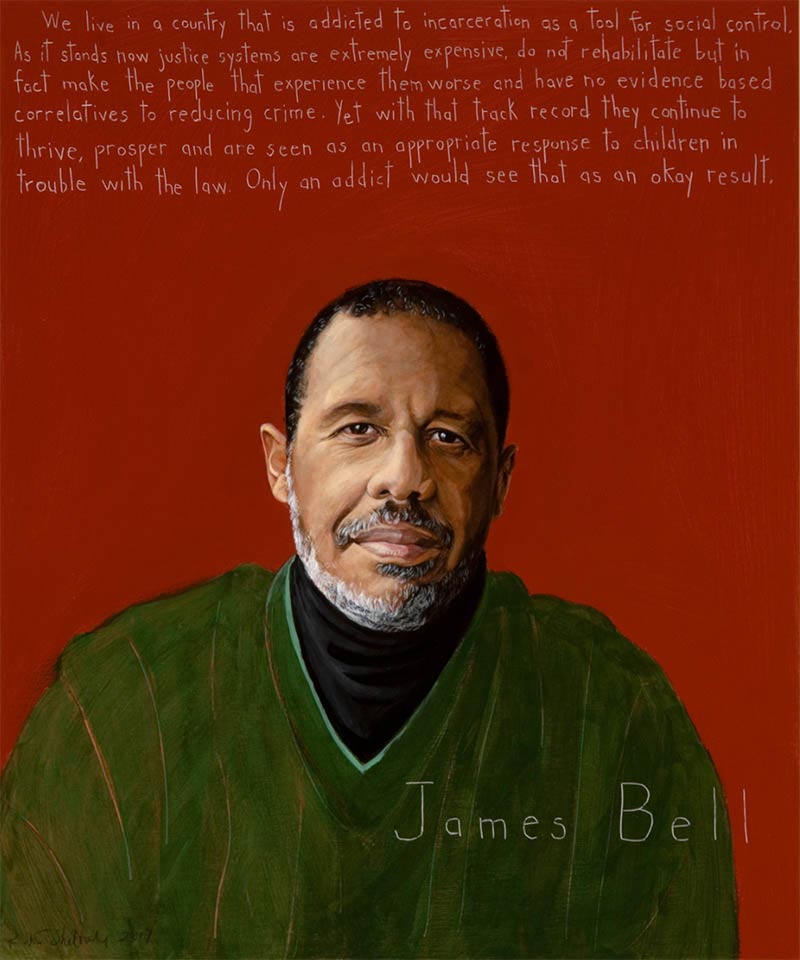
James Bell
Attorney, Youth Justice Activist : b. 1954
“We live in a country that is addicted to incarceration as a tool for social control. As it stands now justice systems are extremely expensive, do not rehabilitate but in fact make the people that experience them worse and have no evidence based correlatives to reducing crime. Yet with that track record they continue to thrive, prosper and are seen as an appropriate response to children in trouble with the law. Only an addict would see that as an okay result.”
Biography
Working for equality and justice in the legal system is James Bell’s mission as an attorney and activist. His efforts are directed at the rights of juveniles, particularly those disadvantaged by their race and/or socio-economic status. He is determined to find a positive way to reduce the number of young people in jail.
Since graduating from Hastings College of Law in 1978, Bell’s experience in juvenile justice systems has been global. He has worked in South Africa with the African National Congress and with both Palestinians and Israelis to find alternatives to incarceration for juveniles. Bell has also traveled to places such as Brazil, Cambodia, Kenya and France, to train officials in how to enforce the human rights for children.
Juvenile justice, however, is by no means an overseas problem. James Bell worked for 20 years as a lawyer at the Youth Law Center in San Francisco. During that period he witnessed a disproportionate number – when compared with white and privileged offenders — of poor youths and young people of color being jailed.
When Bell was hosting a group of Romanians observing the American legal system, one of the diplomats asked if they could now go and watch the white court, having witnessed the black court. The question was a jolt to Bell, and he decided something needed to change. He says, “If you look at the system, you see that there are points where kids of color are swooped into it, and white kids are bounced out, where there is Velcro sticking to us, and Teflon is letting them go. We want to see where those points are. Because it is those decisions that determine if justice is being applied fairly and equitably. No one’s race/ethnicity/gender or place of residence should determine legal outcomes.”
James Bell then shifted his energies to developing a method to change the juvenile justice system. Bell created a program to collect information from all steps along the process to youth incarceration, from initial police contact to the trial and the sentencing; every statement given by the police and judges explaining their reasons for arrest, for possible detention before trial, and for imprisonment is collected and analyzed.
In 2001, Bell founded the W. Haywood Burns Institute, named for a lawyer who had fought for human rights and justice. The Institute examines the underlying reasons for the racial disparity among young people deprived of their liberty, and looks for ways to reduce the number of incarcerated young people in general. It also builds and supports programs like the Community Justice Network for Youth to provide alternatives to prison by keeping young people engaged in their communities and out of trouble. As Bell writes, “…we are dedicated to working to improve the life opportunities for youth and families that bear the brunt of the failure of public systems serving the poor, resulting in a cradle to prison pipeline.”
James Bell’s model has been employed in Santa Cruz, Tucson and other cities with the goal of assuring that justice is applied with fairness and equity for children, youth, families and communities.
Programs
Americans Who Tell the Truth (AWTT) offers a variety of ways to engage with its portraits and portrait subjects. Host an exhibit, use our free lesson plans and educational programs, or engage with a member of the AWTT team or portrait subjects.

Education
AWTT has educational materials and lesson plans that ask students to grapple with truth, justice, and freedom.

Exhibits & Community Engagement
AWTT encourages community engagement programs and exhibits accompanied by public events that stimulate dialogue around citizenship, education, and activism.